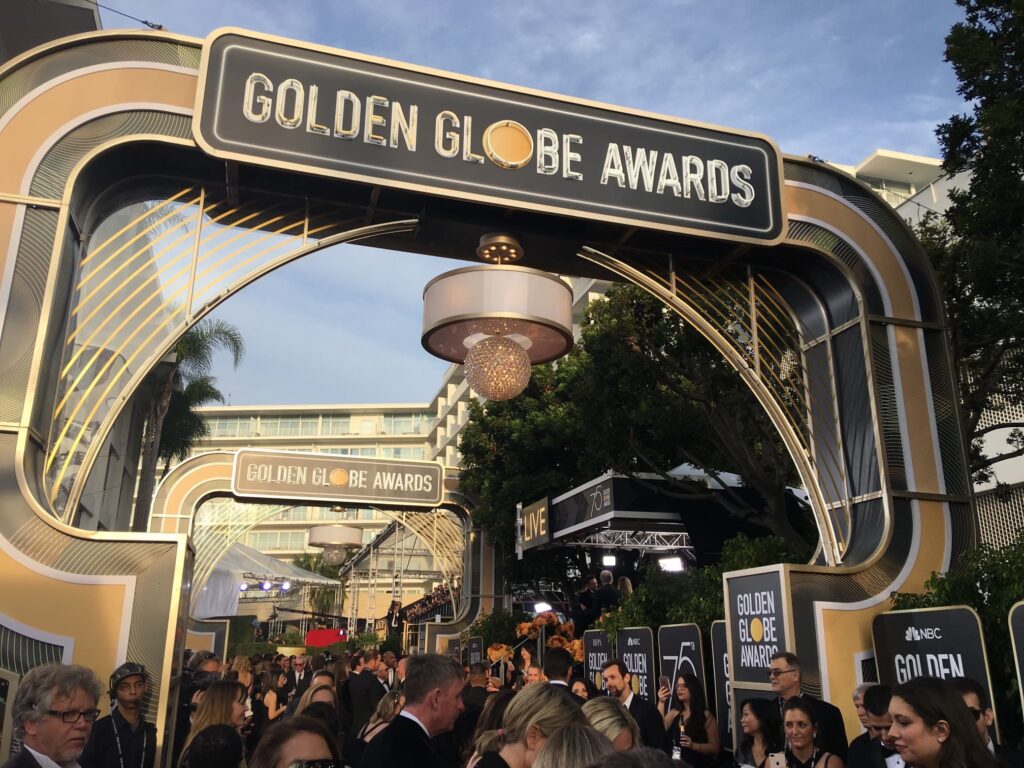History catches up with the Golden Globes

Can you hear the crash of mighty pillars collapsing all over Los Angeles? It’s a season for revolution, retribution, and revenge, a time both momentous and frightening. For decades—forever—critics have eloquently called out the many hypocrisies (and actual crimes) of show business. It turns out that this was a bit different than doing something about them. We are now engaged in that process, and while demolishing old systems can be a heady rush, it is often hazardous, for who knows what else may tumble loose in the process. A far better Hollywood may be forged out of the rubble, or maybe we will be left with no Hollywood at all. Meantime, not a few big names huddled in shelter, waiting for things to settle. Or, as one famous screenwriter recently quipped: “Who do I have f— to get out of this town?”
As I wrote in a previous column, the awards show, as tool of mass marketing and as a mass entertainment, is a melty iceberg; it belongs to a dying ecosystem. There may be no more old-fashioned a show business institution as the Hollywood Foreign Press Association, the famously oddball claque behind the Golden Globes, which have served as an extension of the studio hype apparatus since 1943. As the Los Angeles Times explored in a series investigations starting in February, the only thing verifiably true about the HFPA is the “Hollywood” in its name. Conservatively, tens of millions of dollars have been spent over the years schmoozing the group’s 87 members, most of whom have rather tenuous ties to legitimate journalism, overseas or otherwise. For this handful, the Globes have been a gravy train, while also serving the interests of studios, stars and television networks. Bluntly, those interests are no longer aligned.
The LA Times reports laid bare, at a most inconvenient time, a Byzantine array of ethical whoopsies and self-dealing that have been a feature, not a bug, of the Globes from time immemorial. It also exposed that the organization has no Black members, prompting a push from Time’s Up, the workplace equity organization formed in the wake of the Harvey Weinstein allegations in 2018, and more than 100 public relations firms to boycott the HFPA. The March letter from those PR agencies demanding change or else they would pull talent from all Globes-related events, was a mortal wound to a group that thrives on putting its membership in awkward company with famous people. The HFPA’s hapless promises to clean up its act have prompted wave after relentless wave of attack, from former friends at the studios, from executives, and most trenchantly, from talent. Scarlett Johansson neatly bottom-lined the rottenness at the core of the enterprise, calling the HFPA “an organization that was legitimized by the likes of Harvey Weinstein to amass momentum for Academy recognition,” and Tom Cruise returned his three Golden Globes in protest (let’s see if others follow suit). NBC’s decision to pull the plug on its 2022 Globes telecast is a finishing blow.
Witnessing this all from a safe-ish distance, you might wonder why things went south so fast for the hosts of what was relentlessly promoted as “Hollywood’s Party of the Year.” Much of this has to do with aspects of the affair that had been viewed as strengths. The Globes are not tethered to a foundational Hollywood institution like the Academy, and therefore don’t have a large, nettlesome body of voting members embedded in the industry. As Johansson pointed out, this served Weinstein and many others, who used them to tee up projects for the Oscars. As a television programming conceit, they also offered particular advantages: the were the first awards show to view screened entertainment the way audiences do, in that the Globes blurred the lines between film and television; they focused on top-line performers (no boring technical categories); they were set up as a boozy banquet, which gave them, especially in the early televised years, a certain freewheeling charm.
Seething underneath this was something else. For years, insiders have complained about having to glad-hand the HFPA, from actors having to pose for countless selfies to having to endure far worse. Still, for the public, the Globes played the fun awards show to great success. The awkward moments and qualities of an uncensored roast made them, at least in moments, more diverting than the Oscars and the Emmys. From the superficial perspective of the viewer, it would also be incorrect to say that they were oblivious to the politics of their times. The Globes, like all awards shows, had instances of virtue-signaling and activist oratory. At least one moment — Oprah Winfrey’s 2018 Cecil B. DeMille Award speech was viewed as a potentially presidential moment. And it’s hard to imagine the poke Ricky Gervais took at Apple happening at another ceremony. Perhaps because of their long association with Weinstein, the Globes were also the first awards show to visibly showcase Time’s Up and the #MeToo movement. None of this may be enough to save them.
To the surprise of absolutely nobody, the ratings for this year’s Globes telecast were abysmal. Even allowing for the disruptions of a pandemic, this underscores a bottom line structural problem far beyond the politics of the day. The public at large is not riveted by the exercise as constructed, and window-dressing isn’t going to fix it. Do we really need a reformed Golden Globes, or for that matter, an entire awards season? Industry people, including those leading the charge to fix the Globes, should ask themselves that hard question. I suspect if we are honest about our own habits as consumers of entertainment, we may have our answer.
The systemic critique of the Globes is that the HFPA is not inclusive, by rather sinister design. The far bigger issue is that it in many ways they are a corrupt absurdity we have outgrown. It remains to be seen if diversifying the membership of such a club goes any way toward rewriting the basic premise. On a tectonic level, people have complained for decades about greed, grifting, and general skeeviness. And, for an equally long time, all this was greeted with the universal shrug that translates to, “that’s showbiz.” Until, rather abruptly, it wasn’t anymore.
